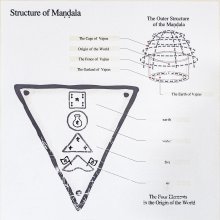Bhana, Bhāṇa, Bhāṅa: 23 definitions
Introduction:
Bhana means something in Buddhism, Pali, Hinduism, Sanskrit, Jainism, Prakrit, the history of ancient India, Marathi, Hindi. If you want to know the exact meaning, history, etymology or English translation of this term then check out the descriptions on this page. Add your comment or reference to a book if you want to contribute to this summary article.
Bhana has 22 English definitions available.
Images (photo gallery)
Languages of India and abroad
Sanskrit dictionary
[Deutsch Wörterbuch]
Source: Cologne Digital Sanskrit Dictionaries: Böhtlingk and Roth Grosses Petersburger WörterbuchBhāṇa (भाण):—(von bhaṇ) m. Bez. einer Art von Schauspielen [Hemacandra’s Abhidhānacintāmaṇi 284.] [DAŚAR.1,8.] [Sāhityadarpana 513.] [PRATĀPAR. 20,a,1. 6.] bhāratīvṛttibhūyiṣṭhaṃ śauryasaubhāgyasaṃstavaiḥ . sūcyete vīraśṛṅgārau viṭena nipuṇoktinā . kalpitenetivṛttena dhūrtacāritravarṇanam . eko ṅko mukhanirvāhau yatra bhāṇaḥ sa saṃmataḥ . [24,a,6.] [Oxforder Handschriften 146,a, No. 310.] — Vgl. bhāṇikā .
--- OR ---
Bhāna (भान):—(von 1. bhā) n. das Erscheinen, Sichtbarwerden; Einleuchten [Bālabodhanī 6. 16.] [Bhāṣāpariccheda 65.] [Vedānta lecture No. 2. 124.] [Nīlakaṇṭha 48.] [Oxforder Handschriften 223,b,41.] [KUSUM. 58,14.]
--- OR ---
Bhaṇa (भण):—(von bhaṇ) vgl. durbhaṇa .
--- OR ---
Bhāna (भान):—, füge das zur-Vorstellung-Kommen, Erkenntniss hinzu.
Source: Cologne Digital Sanskrit Dictionaries: Sanskrit-Wörterbuch in kürzerer FassungBhaṇa (भण):—m. das Sagen , Angeben in ḍurbhaṇa.
--- OR ---
Bhāṇa (भाण):—m. eine Art Schauspiel.
--- OR ---
Bhāna (भान):—n. —
1) Schein [253,15.284,25.] —
2) das zur Vorstellung Kommen , Erkenntniss.
Sanskrit, also spelled संस्कृतम् (saṃskṛtam), is an ancient language of India commonly seen as the grandmother of the Indo-European language family (even English!). Closely allied with Prakrit and Pali, Sanskrit is more exhaustive in both grammar and terms and has the most extensive collection of literature in the world, greatly surpassing its sister-languages Greek and Latin.
See also (Relevant definitions)
Starts with (+48): Bhana-major, Bhanaaki, Bhanabhana, Bhanabhanagudu, Bhanabhanam, Bhanabhanana, Bhanabhananem, Bhanabhanata, Bhanabhanaunu, Bhanabhanavinem, Bhanabhanita, Bhanabhanya, Bhanabhi, Bhanabhuja, Bhanabhuna, Bhanabhune, Bhanaga, Bhanagada, Bhanagadakhora, Bhanagadanem.
Ends with (+231): Abbhana, Abhana, Abhibhana, Abhilambhana, Agnistambhana, Agrabhana, Ahijambhana, Akkebhana, Akkhobhana, Akshayapratibhana, Alabhana, Alambhana, Ambalabhana, Ambhana, Amitradambhana, Anandatilakabhana, Anangajivanabhana, Anangamangalabhana, Anangasarvasvabhana, Anangavijayabhana.
Full-text (+148): Bhanika, Mukundananda, Bhanasthana, Prabhana, Durbhana, Bhanatas, Pradyumnananda, Bhan, Bhaṇita, Bhanaka, Shringarakosha, Bhana-major, Durbhanatva, Bhanavat, Pratibhanavattva, Nicumpanam, Vrishabhanu, Bhamakanakamuni, Mishrabhana, Bhaṇati.
Relevant text
Search found 30 books and stories containing Bhana, Bhāṇa, Bhānā, Bhāna, Bhaṇa, Bhāṅa; (plurals include: Bhanas, Bhāṇas, Bhānās, Bhānas, Bhaṇas, Bhāṅas). You can also click to the full overview containing English textual excerpts. Below are direct links for the most relevant articles:
Vishnudharmottara Purana (Art and Architecture) (by Bhagyashree Sarma)
1.4. Types of Drama < [Chapter 3 - Drama and Dance]
4. Instrumental Music (Vādya) < [Chapter 2 - Music]
Hanuman Nataka (critical study) (by Nurima Yeasmin)
Part 2: Varieties of Dṛśyakāvya < [Chapter 1]
Dasarupaka (critical study) (by Anuru Ranjan Mishra)
Part 3-6 - Bhāṇa rules < [Chapter 2 - Bhāṇa (critical study)]
Part 14 - Conclusion < [Chapter 2 - Bhāṇa (critical study)]
Introduction to the Bhāṇa type of Drama < [Chapter 2 - Bhāṇa (critical study)]
Satirical works of Kshemendra (study) (by Arpana Devi)
7. Prominent Satirical Works in Sanskrit < [Chapter 1 - Introduction]
7.4. Summary of the Pādatāḍitaka < [Chapter 1 - Introduction]
7.3. Summary of the Dhūrtaviṭasaṃvāda < [Chapter 1 - Introduction]
Dhammapada (Illustrated) (by Ven. Weagoda Sarada Maha Thero)
Verse 264-265 - The Story of Venerable Hatthaka < [Chapter 19 - Dhammaṭṭha Vagga (Established in Dhamma)]
Gati in Theory and Practice (by Dr. Sujatha Mohan)
Relevance of Gati in Rūpakas < [Chapter 3 - Application of gati in Dṛśya-kāvyas]
Gati performed in Lāsyāṅgas < [Chapter 3 - Application of gati in Dṛśya-kāvyas]
Importance of Gati in Uparūpakas < [Chapter 3 - Application of gati in Dṛśya-kāvyas]
Related products

